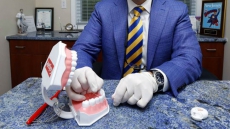TORONTO — Angie Illerbrun had no idea her daughter Olivia was having trouble seeing until she had her own eyes checked and the optometrist suggested he take a look at the toddler's eyes as well.
While Olivia, then about age 2 1/2, watched a cartoon in his exam room, Dr. Barry Thienes shone a light in her eyes. His verdict, recalled Illerbrun: her daughter had extremely bad eyes.
"There was never even a clue that there was anything wrong," said Illerbrun, a legal assistant in Shaunavon, Sask., southwest of Regina, who also helps work her mother's farm outside town.
"When she was little, she would watch TV like a normal kid. We would hand her a book and my husband would kind of tease her and put it upside-down, and she would turn it right-side up," she said. "On the farm, she didn't trip or walk into anything."
But it turned out seeing the world up close wasn't the problem — it was making out objects at a distance. Olivia was near-sighted and had an astigmatism. She was initially prescribed glasses with a mild correction, which was progressively strengthened every six months until she reached age six.
Thienes, who practises in Shaunavon and nearby Maple Creek, said there are some signs parents can watch for that indicate a toddler's or preschooler's vision may not be optimal.
"In some cases, they might squint, they might look at things funny, hold things close, sit too close to the TV, rub their eyes a lot," said Thienes, president of the Canadian Association of Optometrists (CAO).
"Those would be some of the signs, but a lot of the signs are not very obvious, especially in a very young child between six months and, say, five years (of age)."
That's why the CAO recommends that children have a comprehensive eye exam between six and 12 months of age, followed by another between age two and five, then annually throughout the school years.
Besides having refractory problems leading to near-sightedness (myopia), far-sightedness (hyperopia) and astigmatism, young children may have a crossed eye or out-turned eye. Known clinically as strabismus, it's a muscle condition in which the eyes are not properly aligned, resulting in double vision or suppression of the image from the affected eye, the CAO says on its website.

Up to four per cent of children under age six have amblyopia, or a lazy eye, which occurs when there is weak vision or vision loss in one eye. Because the image sent to the brain from the affected eye is poor, the brain will ignore that eye. Over time, few connections will be made between the brain and the eye.
That's why amblyopia needs to be treated early — with vision therapy, eyeglasses, contact lenses or patching the good eye to make the weak one work harder — as treatment later becomes difficult, said Thienes.
"If you don't catch it early on in life, even though you might correct it when they're 10 or 12 years old, you still can't get the vision up because the eye never was used properly during the developmental stage," he said. "So even though everything looks healthy, it will never work properly for the rest of their life."
Once the diagnosis is out of the way, it may turn out that glasses with corrective lenses are needed to bolster a young child's visual acuity.
Then there's the next challenge: getting an active toddler or preschooler to wear them — and keep wearing them.
"The longer you wait, the harder it is to introduce the child to spectacles ... because they're not used to putting any kind of glasses on their face," said Dr. Josh Josephson, a former optometrist who owns Josephson Opticians in Toronto and is involved in vision-related research.
"They don't really understand the purpose. You have to work with them and you set an example," said Josephson, advising that parents start by donning sunglasses, which he stressed that both adults and every young child should wear when outside to protect against eye damage from the sun's ultraviolet rays.
For example, he suggested parents try this: "'Look, I've got something for you, too. You can be just like Dad or Mom.' Kids like to mimic their parents and so it can inspire them."
With Samantha Levenson's son Ely, having spectacles like Daddy's seemed to be the answer to getting the then four-year-old to accept the fact he needed glasses to see properly.
Ely insisted he wanted to go to the same optician where his father had bought his prescription glasses, the Toronto lawyer recalled.
"Well those glasses lasted about five seconds. He didn't want to wear them once he actually got them."
When Ely got a little older — and more style-conscious — he picked out some "crazy, fashionable glasses," she said. "He was loving people coming up to him and saying 'Where did you get those glasses? They're so cool.'
"Even at that point, he wouldn't wear them," Levenson said, adding that it wasn't until her son was in senior kindergarten that he wore his glasses in school, and then only because the teacher made him.
Home was a different story. "I'd say put your glasses on and he'd say no."
It was only after his eighth birthday last year that Ely started wearing his glasses full-time, she said.
"He realizes now that he can't see without them. Now he doesn't leave the house without putting them on."
Illerbrun didn't have to go through that struggle with Olivia, who's now 12 and a veteran at wearing glasses since about age three.
"We made it a big event. She got to pick Barbie glasses for the very first time," said her mom, describing the eyewear as pink with sparkles.
"I think it just helped her so much. Never once did I have to say: 'Go put your glasses on.'"




